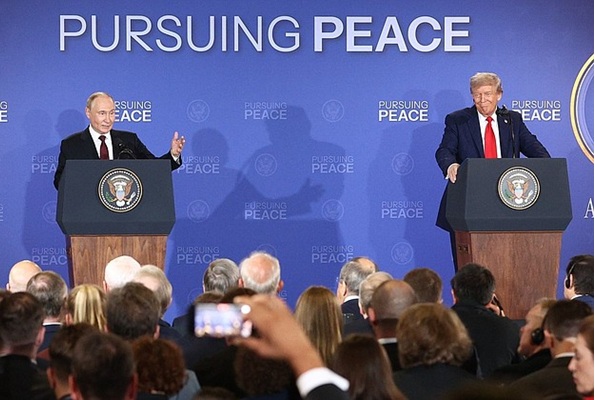.png)
Markets Turn Risk-Off as US Sanctions on Russia, China Curbs Stir Global Tensions
Here’s your quick read to start the day: a chatty, no-fuss look at overnight moves, the big story, what’s on the docket, and the tickers you need to watch.

October 23, 2025 at 1:15 AM IST
GLOBAL MOOD: Cautiously Risk-off
TODAY’S WATCHLIST
- Earnings: Hindustan Unilever, Colgate Palmolive
THE BIG STORY
At the same time, the Trump administration is weighing expansive export controls on China, potentially limiting global shipments of goods made with US software. The proposal follows Beijing’s latest curbs on rare earth exports and could escalate tensions between the world’s two largest economies.
Data Spotlight
In the UK, annual inflation held steady at 3.8% in September, surprising markets that had expected a rise to 4%. The reading, driven by slower services’ inflation, has strengthened expectations of a Bank of England rate cut later this year, offering some political relief ahead of the November budget.
Takeaway:
WHAT HAPPENED OVERNIGHT
- US stocks slipped as earnings disappoint, China curbs weigh on tech
- Wall Street ended lower Wednesday amid mixed corporate results and renewed trade jitters.
- Nasdaq led losses, dragged down by tech and communication services stocks.
- Texas Instruments fell 5.6% on weak guidance, while Netflix slipped after lackluster results.
- Wall Street ended lower Wednesday amid mixed corporate results and renewed trade jitters.
- US Treasury yields extended decline amid shutdown, weak data flow
- The 10-year yield dropped 1.4 bps to 3.95%, marking a third straight session of declines.
- The prolonged US government shutdown and lack of key data weighed on sentiment.
- A strong $13 billion auction of 20-year bonds bolstered demand for longer maturities.
- The 10-year yield dropped 1.4 bps to 3.95%, marking a third straight session of declines.
- US dollar steadied near one-month high; shutdown uncertainty capped gains
- The dollar index briefly crossed 99 before easing to 98.9, halting a three-day rally.
- Early gains came as softer UK inflation data reinforced rate-cut expectations for the Bank of England.
- Traders turned cautious as the US shutdown persisted, with Trump rejecting a meeting request from Democratic leaders.
- The dollar index briefly crossed 99 before easing to 98.9, halting a three-day rally.
- Oil surged as US sanctions on Russia reignited supply fears
- Brent crude oil jumped 4.9% to $64.35 per barrel; WTI rose 2.4% to $59.92.
- Prices climbed after Washington imposed sanctions on Russian oil majors over the Ukraine conflict.
- Markets priced in tighter global supply as sanctions threatened to disrupt energy exports.
- Brent crude oil jumped 4.9% to $64.35 per barrel; WTI rose 2.4% to $59.92.
Day’s Ledger
Economic Data
- US Sep Existing Home Sales
- US Jobless Claims
Corporate Actions
- Jul-Sep Earnings: Hindustan Unilever, Colgate Palmolive, Laurus Labs, Vardhman Textiles, Tata Teleservices
- Avasara Finance to consider rights issue
- Himatsingka Seide to consider fund raising
- Ugro Capital to consider fund raising
Policy Events
- BoE Woods Speech
- BoE Hall Speech
- ECB Lane Speech
TICKERS TO WATCH
- INFOSYS promoters opt out of ₹180 b illion share buyback, retain holdings
- ITC HOTELS opens 98-key Welcomhotel in Bodh Gaya, boosting tourism
- NCLT orders proceedings against Bhilai JAYPEE CEMENT over ₹450 million default
- JAGUAR LAND ROVER August hack cost UK economy $2.5 billion: Report
- CCI clears TORRENT PHARMA's proposal to buy stake in JB Chemicals
- TATA MOTORS Passenger Vehicles clock over 100K deliveries in festive period
- JINDAL GROUP likely to send team to assess Thyssenkrupp Steel assets
- JIO-BP sees 34% growth in petrol, diesel sales in July-September quarter
MUST READ
- SFBs boost secured lending as they move towards universal bank status
- Large private banks see green shoots, expect credit demand revival in H2FY26
- US trade deal may reignite interest in manufacturing fund segment
- Freshers back in demand as IT companies revive campus hiring drive
- Indonesia’s Central Bank Surprises With Rate Hold
- Waller, a Top Fed Chair Contender, Backs Rate Cuts Without Bowing to Trump
- Beyond Grants: Rethinking How India Funds Infrastructure
- India’s Growth Will Run on Commodities, But Are We Ready?
- Cybersecurity Is No Longer Optional; It’s Economic Survival
- Between UPI and Cryptos, India's Digital Rupee Fights for Relevance
See you tomorrow with another edition of The Morning Edge.
Have a great trading day.
Can Acquisitions Transform the Indian Financial Sector?
GURUMURTHY R writes, "Buy, don’t build” seems to be the new mantra in India’s banking market.
From Emirates NBD’s move on RBL Bank to Sumitomo Mitsui’s bet on Yes Bank, global lenders are rethinking how they enter India — buying existing franchises instead of building from scratch. It’s faster, cleaner, and capital-efficient.
But here’s the catch: buying access doesn’t buy understanding. The real challenge lies in integrating systems, cultures, and compliance in a market as nuanced as India’s.
If foreign capital and Indian management find common rhythm --not just coexistence-- this wave could reshape the country’s financial landscape. If not, it will be another déjà vu from the 2000s.
India doesn’t just need foreign banks that arrive--it needs ones that adapt, align, and add depth.



